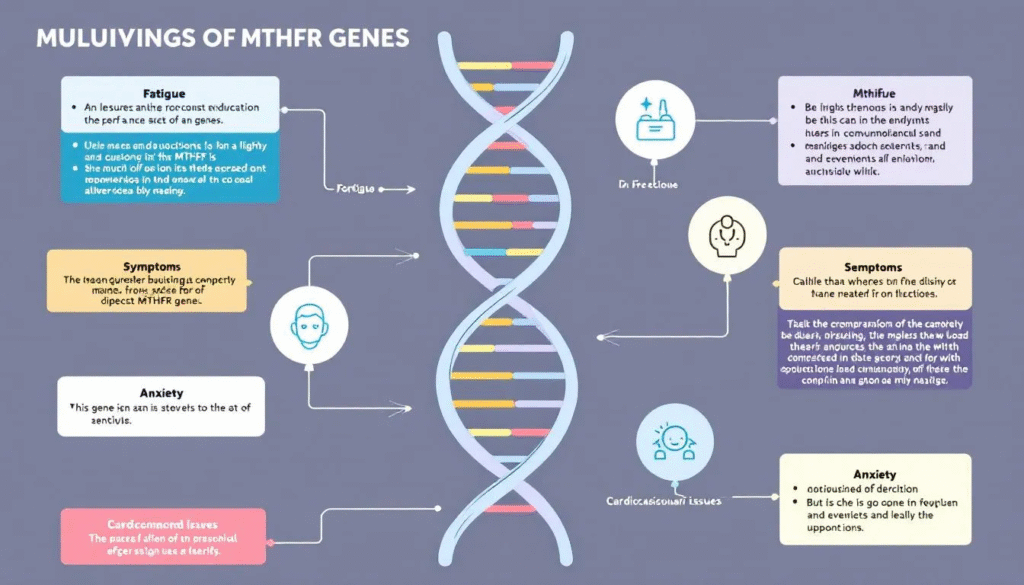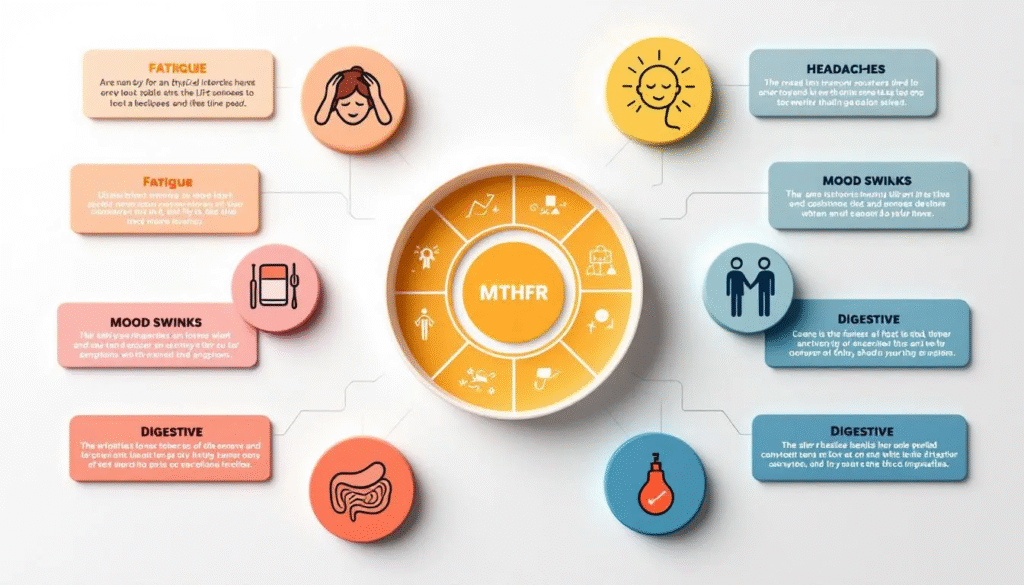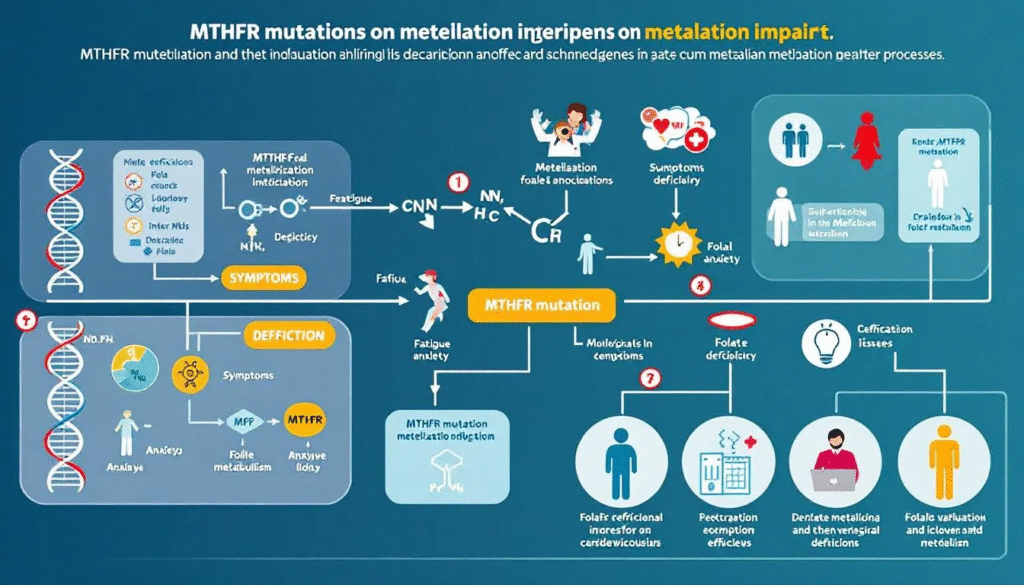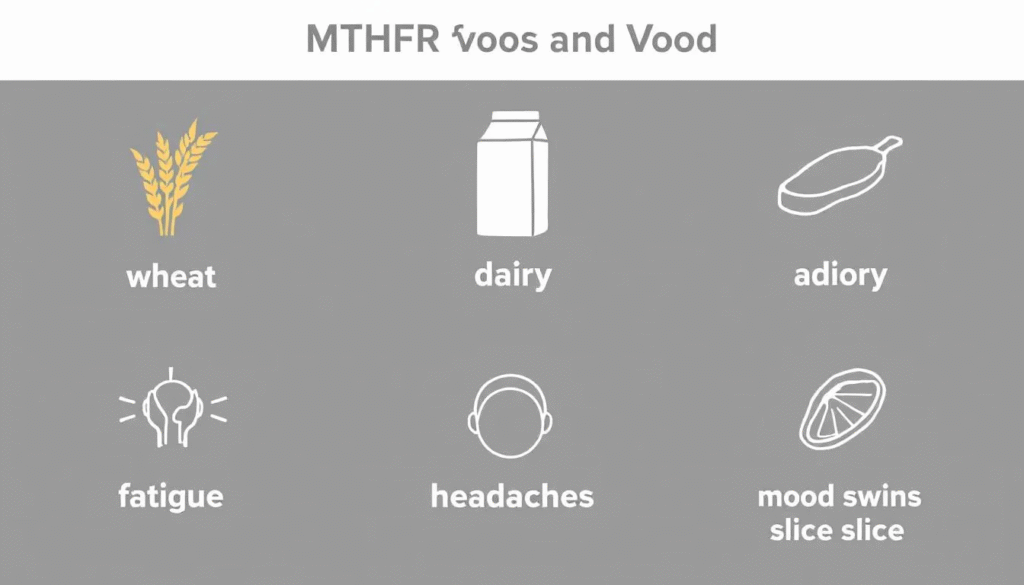Wondering what are MTHFR symptoms? MTHFR gene mutations often lead to anxiety, depression, high homocysteine levels, and digestive issues. This article will explore these symptoms in detail and how to manage them.
Key Takeaways
The MTHFR gene mutation affects folate metabolism, leading to elevated homocysteine levels associated with cardiovascular diseases and other metabolic disorders.
Common symptoms of MTHFR mutations include anxiety, digestive issues, and nutrient deficiencies, which can significantly impact an individual’s daily life and mental health.
Dietary and lifestyle modifications, such as increasing folate intake and managing stress, are essential for natural management of symptoms associated with MTHFR mutations.
Understanding MTHFR Gene Mutation

The MTHFR gene, or methylenetetrahydrofolate reductase mthfr, is located on chromosome 1p36.3 and plays a pivotal role in converting folic acid into methylfolate, an active form of folate crucial for breaking down homocysteine. This process is essential for numerous bodily functions, including DNA synthesis, repair, and methylation cycle, which affects gene expression and detoxification. The methylenetetrahydrofolate reductase gene is vital for these processes, and severe methylenetetrahydrofolate reductase deficiency can impact these functions.
Common variants of the MTHFR gene include C677T and A1298C, with C677T being the most frequently studied mutation linked to folate metabolism. These mutations can disrupt vital health functions, leading to increased levels of homocysteine, which is associated with cardiovascular diseases, blood clotting issues, and other metabolic disorders. The mthfr gene variant and mthfr variants can also play a role in these health concerns, particularly in relation to mthfr genes.
Understanding these genes genetic mutation variations is the first step towards managing and mitigating their impact on your health.
Common Symptoms of MTHFR Gene Mutations

Individuals with MTHFR gene mutations often experience a range of mthfr gene mutation symptoms that can be easily overlooked or misdiagnosed. Common symptoms include anxiety, digestive issues, and brain fog, which can significantly affect daily life for people with mthfr. These symptoms are frequently misunderstood, leading to confusion and frustration for those affected.
Health conditions associated with MTHFR mutations include nutrient deficiencies, mental health disorders, and an increased risk of high blood pressure. Many individuals report noticeable improvements in their mood, digestion, and energy levels after starting a protocol that includes methylated supplements, highlighting the importance of proper diagnosis and treatment of mthfr deficiency.
Mental Health Symptoms
MTHFR mutations can significantly impact mental health, primarily due to their effect on neurotransmitter production:
Methylation is critical for producing neurotransmitters.
Disruptions caused by MTHFR mutations can lead to mood disorders.
Low folate levels, a common consequence of these mutations, can exacerbate symptoms of anxiety and depression.
Research has linked MTHFR gene variants to an increased risk factors of developing schizophrenia, major depression, and bipolar disorder, particularly in certain ethnic groups such as Asians. Individuals with these mutations may also experience a heightened susceptibility to stress and neurotransmitter imbalances, further complicating their mental health.
Physical Health Symptoms

Physical health issues commonly associated with MTHFR mutations include:
Elevated homocysteine levels, which are linked to an increased risk of cardiovascular diseases, including heart disease and deep vein thrombosis
Blood clots
Stroke
High blood pressure These conditions pose significant health risks.
Apart from cardiovascular conditions, MTHFR mutations can impact other areas of physical health. For instance, elevated homocysteine can affect the eyes and joints, leading to conditions such as neuropathy, especially in individuals with diabetes. Joint pain and other related symptoms often require attention from healthcare professionals to manage effectively.
Digestive and Nutritional Symptoms
MTHFR mutations can lead to deficiencies in essential vitamins, including folate and B vitamin 12, which are critical for digestive health. These deficiencies can disrupt the health of the intestinal lining, leading to digestive issues such as abdominal pain and nausea.
Individuals with MTHFR mutations are more prone to developing gastrointestinal disorders due to impaired nutrient absorption. Increased intestinal permeability, or ‘leaky gut’, and a compromised gut microbiome can result from low folate levels, further impacting immune function and increasing inflammation.
How MTHFR Gene Mutations Affect Methylation

The MTHFR gene is crucial for converting one form of folate into another, playing a significant role in the breakdown of homocysteine. Proper methylation is essential for detoxification, neurotransmitter production, and gene expression. When MTHFR gene mutations occur, they compromise this process, leading to elevated homocysteine levels and a host of health issues related to the mthfr enzyme.
Symptoms of impaired methylation issues include the following symptoms: fatigue, mood fluctuations, and poor digestion, as methylation regulates hormones and mood.
The MTHFR gene influences mental health by coding for an enzyme involved in converting folate for neurotransmitter production, making proper methylation vital for overall well-being.
Testing for MTHFR Gene Mutations
Testing for MTHFR gene mutations typically involves:
A blood sample to identify specific alterations in the MTHFR gene
Looking for prevalent variants, such as C677T and A1298C
A mthfr mutation test that can be completed in under five minutes without any special preparation, including mthfr gene testing, mthfr polymorphism testing, genetic testing, and a screening test.
Results from the test indicate whether one or both gene variants are present, confirming the presence of an MTHFR mutation. High homocysteine levels, while not directly measuring MTHFR mutations, can prompt the need for further testing of elevated levels.
Consulting a healthcare professional for interpretation and subsequent steps is crucial for effective management.
Natural Management Strategies for MTHFR Mutations
Managing MTHFR mutations naturally involves several lifestyle and dietary changes aimed at improving methylation and reducing symptoms. These strategies include increasing folate intake, managing stress levels, and supporting detoxification processes, along with mthfr gene mutation treatment.
Implementing these changes can significantly improve the quality of life for individuals with MTHFR mutations.
Increase Folate Intake
Increasing folate intake is crucial for individuals with MTHFR mutations, as it helps manage the symptoms associated with these genetic variants. Folate-rich foods, such as dark leafy greens, avocado, and legumes, should be included in the diet, along with active folate.
It’s also important to avoid folic acid, which can be hard to process folate for those with MTHFR mutations, and instead opt for a bioavailable form of methylated forms of folate. Always consult with a healthcare professional before making any dietary changes.
Manage Stress Levels
Stress management is essential for individuals with MTHFR mutations, as stress can exacerbate symptoms and worsen overall health. Practicing mindfulness and other stress-reducing techniques can help lower stress levels and improve emotional regulation.
These practices are particularly beneficial for managing anxiety and other mental health issues associated with MTHFR mutations.
Detoxification Support
Supporting detoxification is vital for those with MTHFR mutations, as these genetic variants can hinder the body’s ability to eliminate toxins effectively. Recommended practices include:
Using natural skincare products
Using natural cleaners
Using air purifiers
Using water filters to reduce toxin exposure.
A high-fiber diet, consisting of 30 to 50 grams of fiber daily, can also enhance detoxification processes.
Foods to Avoid with MTHFR Mutations

Individuals with MTHFR mutations should avoid foods high in synthetic folic acid, such as processed cereals, pasta, and bread, as these can be difficult to process and exacerbate symptoms. Instead, it’s better to choose foods rich in natural folate and methylated B vitamins to support overall health.
Inflammatory foods should also be avoided to reduce health risks associated with MTHFR mutations. By making these dietary adjustments, individuals can help manage their symptoms and improve their overall well-being.
Summary
Understanding and managing MTHFR gene mutations is crucial for maintaining optimal health. By recognizing the symptoms and knowing how to manage them through lifestyle and dietary changes, individuals can significantly improve their quality of life. Key strategies include increasing folate intake, managing stress, and supporting detoxification processes.
Taking proactive steps to address MTHFR-related health issues can lead to noticeable improvements in mood, energy levels, and overall well-being. With the right approach, living with an MTHFR mutation becomes much more manageable.
Frequently Asked Questions
What is the MTHFR gene?
The MTHFR gene, or methylenetetrahydrofolate reductase, is essential for converting folic acid into methylfolate, aiding in the breakdown of homocysteine and supporting vital bodily functions. Understanding its role can be important for overall health management.
What are the common symptoms of MTHFR gene mutations?
Common symptoms of MTHFR gene mutations include anxiety, digestive issues, brain fog, mental health disorders, and an increased risk of high blood pressure. It is essential to monitor these symptoms for potential health implications.
How do MTHFR gene mutations affect mental health?
MTHFR gene mutations can alter neurotransmitter production, which may result in mood disorders, including anxiety, depression, and bipolar disorder. Thus, understanding these mutations could be crucial for addressing certain mental health issues.
How can I manage MTHFR gene mutations naturally?
To manage MTHFR gene mutations naturally, increasing folate intake, managing stress levels, and supporting detoxification through lifestyle and dietary changes are essential. These strategies can significantly improve overall health and well-being.
What foods should I avoid if I have an MTHFR mutation?
If you have an MTHFR mutation, you should avoid foods high in synthetic folic acid, such as processed cereals, pasta, and bread, and instead choose natural folate-rich foods and methylated B vitamins.

